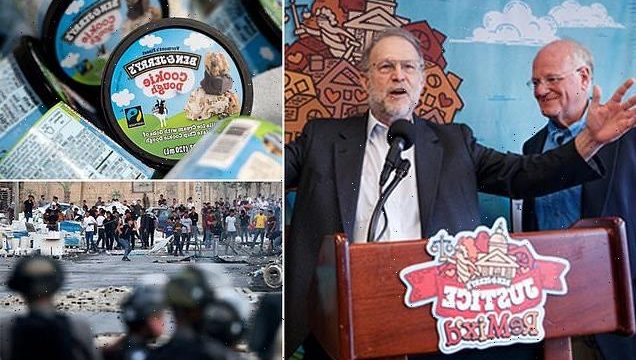Jewish co-founders of Ben & Jerry’s say they ‘unequivocally support’ the company’s decision to stop selling ice cream in the West Bank to boycott Israeli settlements
- Bennett Cohen and Jerry Greenfield co-founded the ice cream chain in 1978 and sold it to the British conglomerate Unilever in 2000
- They praised the actions of the company they founded in an article on Wednesday for The New York Times
- The op-ed comes after Axios reported that the Israeli government formed a special task force to pressure the ice cream chain into reversing its decision
- The boycott has also prompted backlash from members of the Jewish community
- Franchise owners in Manhattan pledged to donate to Israel and towns on Long Island imposed their own bans on the company
The Jewish co-founders of Ben & Jerry’s have said that they ‘unequivocally support’ the company’s decision to stop selling ice cream in the West Bank to boycott Israeli settlements.
Bennett Cohen and Jerry Greenfield, who co-founded the ice cream chain in 1978 and sold it to the British conglomerate Unilever in 2000, endorsed the decision in an op-ed for the The New York Times on Wednesday.
It followed an Axios report revealed that the Israeli government formed a special task force to pressure the ice cream chain into reversing its decision.
The boycott has also prompted backlash from members of the Jewish community in the US – as franchise owners in Manhattan pledged to donate to Israel and towns on Long Island in New York imposed their own bans on the company.
Ben & Jerry’s cofounders Bennett Cohen (left) and Jerry Greenfield (right) penned an op-ed on Wednesday to say that they ‘unequivocally support’ the company’s decision to stop selling ice cream in the West Bank to boycott Israeli settlements
An Israeli flag is seen on a delivery truck outside Ben & Jerry’s factory in Be’er Tuvia
‘We are the founders of Ben & Jerry’s. We are also proud Jews. It’s part of who we are and how we’ve identified ourselves for our whole lives. As our company began to expand internationally, Israel was one of our first overseas markets. We were then, and remain today, supporters of the State of Israel,’ Cohen and Greenfield wrote.
‘But it’s possible to support Israel and oppose some of its policies, just as we’ve opposed policies of the U.S. government.’
Cohen and Greenfield continued: ‘As such, we unequivocally support the decision of the company to end business in the occupied territories, which the international community, including the United Nations, has deemed an illegal occupation.’
The businessmen noted that they no longer have control over the company’s operations but praised Ben & Jerry’s for the ‘especially brave’ decision and said the company is ‘on the right side of history’.
‘Ending the sales of ice cream in the occupied territories is one of the most important decisions the company has made in its 43-year history,’ they wrote.
Cohen and Greenfield continued: ‘Even though it undoubtedly knew that the response would be swift and powerful, Ben & Jerry’s took the step to align its business and operations with its progressive values.’
‘That we support the company’s decision is not a contradiction nor is it anti-Semitic. In fact, we believe this act can and should be seen as advancing the concepts of justice and human rights, core tenets of Judaism.’
The co-founders noted that Ben & Jerry’s distinctly decided to halt sales in the territories which Israel occupies – not the nation of Israel itself.
‘The decision outside Israel’s democratic borders is not a boycott of Israel,’ they wrote. ‘The Ben & Jerry’s statement did not endorse the Boycott, Divestment and Sanctions movement.’
Cohen and Greenfield added: ‘As Jewish supporters of the State of Israel, we fundamentally reject the notion that it is anti-Semitic to question the policies of the State of Israel.’
Omar Barghouti, a co-founder of the BDS movement, has said the movement had been urging Ben & Jerry’s to pull out of Israel for years.
Ben & Jerry’s had announced last week that it would no longer produce ice cream for Israeli settlements on occupied lands
As noted by Axios, the Israeli government is worried other companies will now draw that same distinction between Israel and the West Bank settlements.
In its statement, the company had said it would be ‘inconsistent’ with its values to sell ice cream ‘in the Occupied Palestinian Territory.’
‘Although Ben & Jerry’s will no longer be sold in the OPT, we will stay in Israel through a different arrangement. We will share an update on this as soon as we’re ready,’ the company said.
The company had also announced in the statement that it would not be renewing its license agreement with the Israeli company that manufactures and distributes the ice cream Israel.
Board chair Anuradha Mittal commented on Tuesday for the first time since Ben & Jerry’s announced that it would stop selling ice cream in the West Bank while she rejected calls that the decision was anti-Semitic.
‘I am proud of @benandjerrys for taking a stance to end sale of its ice cream in the Occupied Palestinian Territory,’ Mittal tweeted.
‘This action is not anti-Semitic. I am not anti-Semitic. The vile hate that has been thrown at me does not intimidate me. Pls work for peace – not hatred!’
Palestinian demonstrators clash with Israeli soldiers on Wednesday
Palestinian demonstrators demand on Wednesday that the Israeli army hands over the body of man who was shot dead by Israeli forces on Tuesday night, in the village of Beita, in the occupied West Bank
Palestinian protesters watch Israeli soldiers during a protest over the killing of a Palestinian man by Israeli soldiers in Beita in the Israeli-occupied West Bank on Saturday
A damaged car is seen after Israeli forces opened fire to it and wounded an 11-year-old child in Hebron, West Bank on Wednesday
The Israeli government has previously convinced Ben & Jerry’s not to take such a stance but pressure from pro-Palestinian activists has increased amid recent fighting in Gaza, as noted by Axios.
Israel has even desperately tried to push Unilever to prevent the company from deciding to stop selling ice cream – but Ben & Jerry’s parent company said it had the right under its corporate responsibility policies.
Unilever says it remains ‘fully committed’ to its businesses in Israel and will find a way to continue to produce Ben & Jerry’s inside the country while excluding settlements.
The company has not said how it plans to do this – and despite wide international opposition to the settlements, Israel does not differentiate between them and the rest of its territory.
Three-quarters of the members of the Israeli parliament on Wednesday called on Ben & Jerry’s to reverse its decision to stop selling ice cream in Israeli settlements in the occupied West Bank and contested east Jerusalem.
In a letter to the Vermont-based ice cream maker, the lawmakers said they were ‘standing together against the shameful actions’ of the company.
They called the decision ‘immoral and regrettable,’ claimed it would hurt hundreds of Jewish and Arab workers and violated an Israeli law banning boycotts of the settlements.
The letter was signed by 90 of the Knesset’s 120 members spanning almost the entire political spectrum. Arab parties and some dovish lawmakers refused to sign.
Some 700,000 Israelis live in east Jerusalem and the West Bank – areas captured by Israel in the 1967 Mideast war. The Palestinians, with wide international backing, claim both areas as parts of a future independent state.
Israel has annexed east Jerusalem and says it is part of its capital, but the annexation is not internationally recognized. It says the West Bank is disputed territory whose fate should be resolved in peace talks.
The international community overwhelmingly considers both areas occupied territory.
The government has urged 35 U.S. states with anti-boycott laws to punish Unilever. Several states, including Texas and Florida, have begun to look into the matter but none have taken action yet.
Gilad Erdan, Israel’s ambassador to the United Nations and the United States, told the U.N. Security Council on Wednesday that it was partly responsible for Ben and Jerry’s decision.
‘When this council fails to take strong action against the world´s worst human rights violators like Iran and Syria and instead singles out the world´s only Jewish state, it is no wonder that companies like Ben and Jerry’s and Unilever allow themselves to single out Israel for boycott,’ he said.
‘These companies have no moral reservations about operating in countries which are truly among the world´s worst violators of human rights, while imposing an anti-Semitic boycott on the Jewish state.’
He added: ‘In light of these double standards, the claims of U.N. bodies and companies like Ben and Jerry’s to be motivated by high ideals and objective standards, melt to nothing, like ice cream in the summer sun.’
In New York City, the owner of a Ben & Jerry’s shop on the Upper West Side was so angry over the decision he vowed to donate 10 percent of his proceeds to help Israel, the New York Post reported.
Joel Gasman claims the decision has caused sales at the West 104th Street and Broadway store to drop.
‘We couldn’t sit back and watch without speaking up,’ Gasman told the outlet. ‘It has definitely hurt our bottom line and our overall store value. We did fear boycotts from customers. We still do.’
He added that online trolls have started giving his franchise bad reviews online simply because of the company’s corporate stance.
In the town of North Hempstead on Long Island, local officials ripped Ben & Jerry’s decision as ‘dangerous and anti-Israel,’ The Island Now reported.
In 2017, the town unanimously passed local laws preventing it from working with companies participating in the Boycott Divestment and Sanctions movement.
‘North Hempstead’s Anti-BDS legislation ensures that taxpayer money is never used to do business with or support any company that engages in a boycott of Israel,’ said North Hempstead Supervisor Judi Bosworth.
‘North Hempstead is a community of unity and inclusion. We remain committed in the fight against intolerance and we are unwavering in our condemnation of this BDS movement.’
Source: Read Full Article







